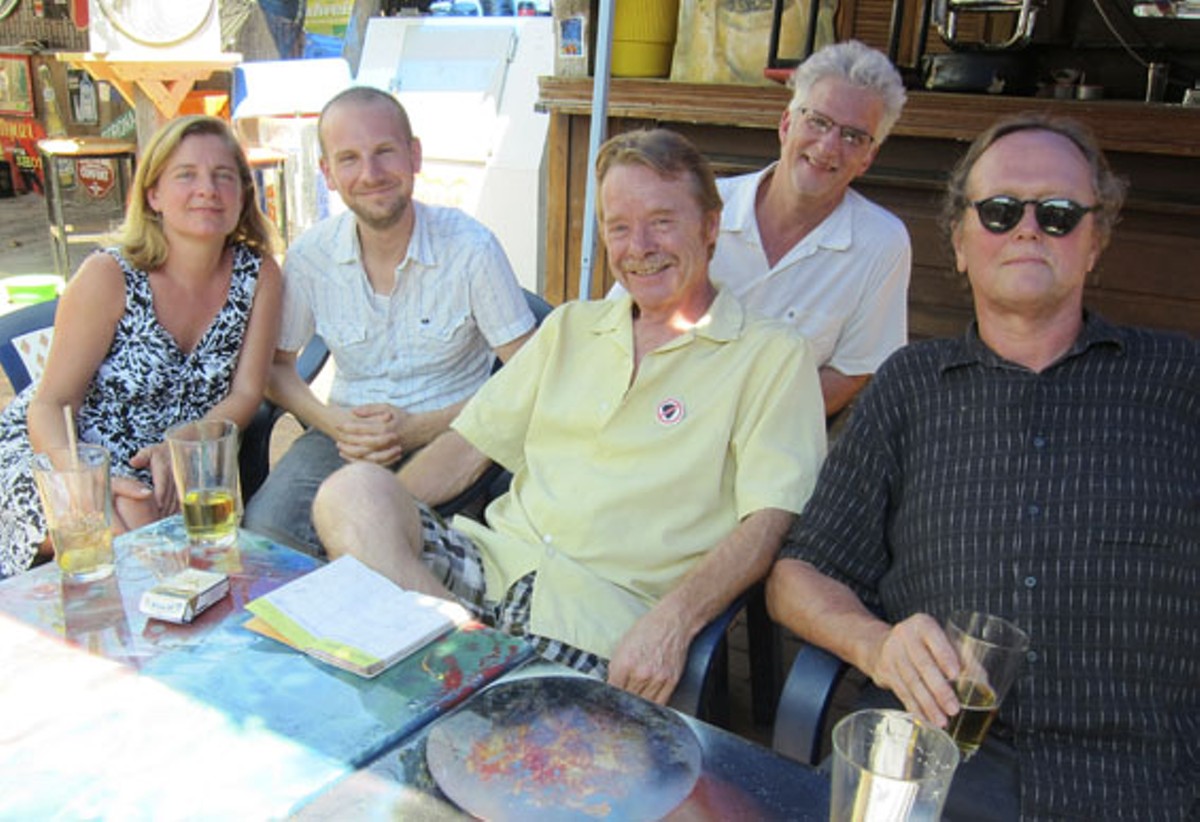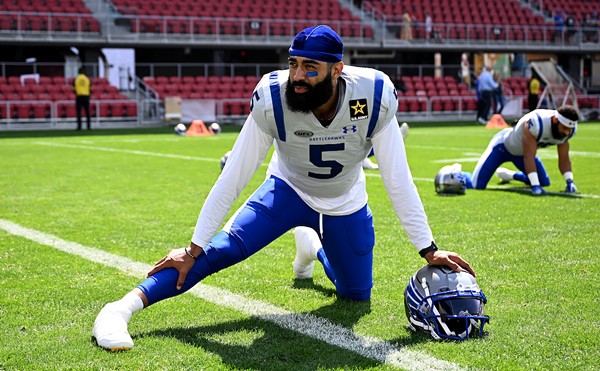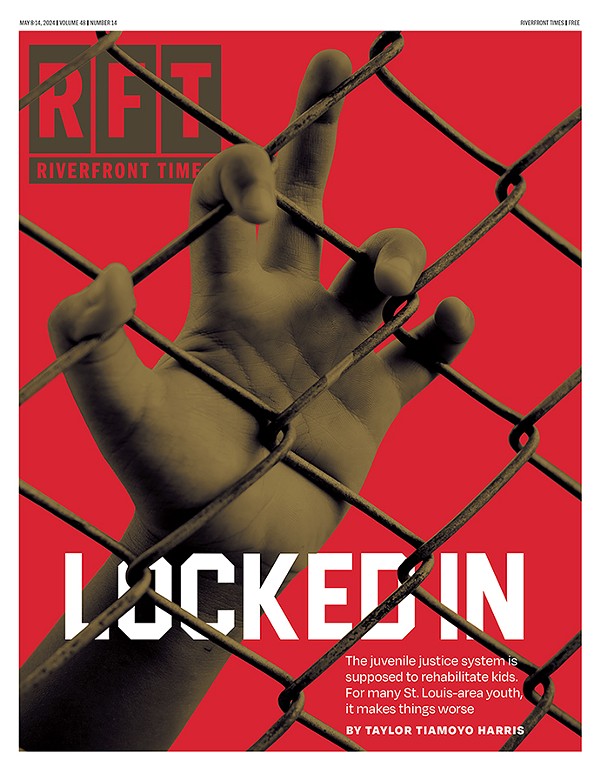On a Sunday afternoon in the Soulard neighborhood of St. Louis, you enter the Shanti through the back entrance. It's a smoking establishment, says the sign on the door, rather like a high-voltage warning at the base of the Grand Coulee Dam.
Inside, a band called Boss Hall is heading toward the penultimate song of its first set, a familiar Rodney Crowell tune. You could hear ice clink in the bloody marys, save that the ventilators are churning full blast and a couple of barflies won't stop talking to hear what singer Margaret Bianchetta does with the song, and what this band — unpredictably anchored by its boss, resophonic guitarist Tom Hall — enables her to do.
It's not a big deal, just another band in Soulard, playing one of the best versions of "'Til I Gain Control Again" that's ever been played.
"I'll tell you the truth," Hall says. "I'd never heard the song before we played it."
"We just play," Bob Breidenbach, the band's Dobro maestro, says.
That's how they say they do it, these five friends — and on this afternoon, a sixth, Kaleb Kirby, son of Bianchetta, on vibraphone — just play, making music that represents the best of everything they've learned over decades in the bars, cafés, honky-tonks, jazz clubs and concert halls of St. Louis.
The sound, for starters, is acoustic, no drums for this gig, just a small amp for Vince Corkery's battle-scarred doghouse bass. The music they make together, and on their recently released debut CD, In the Pale, is not blues, not jazz, not country, not folk, not Irish, not Americana, though all of these forms drift in and out of the sound, like the smoke from the 10,000 gigs they've logged, together and separately, in the bars of St. Louis.
"It's post-music," fiddle player Kevin Buckley quips.
There's a lot to unpack in that and a lot to pick apart in the modesty of "We just play." There's history here between all of them — Bianchetta, Hall, Breidenbach, Buckley and Corkery — and any attempt to sketch a flow chart or a musical family tree would result in something like a diagram for the Higgs boson.
Hall and Bianchetta have a musical friendship that goes back to the mid '80s, when Hall filled in as a soundman for her band SPATZ, joined her in Hot Club Canary and then rigged up a duo, doing Hank Williams songs. They collaborated as part of the Royal Garden Thrillers for a few months, and then the Mighty Big Band, until the two parted ways. The latter still performs every Sunday night at the Missouri Bar & Grill, but it's just too loud for Hall.
Two years ago this October, the friends started to meet at the Shanti. The band didn't have a name, nor hardly a purpose, besides a few drinks on a bleary-eyed Sunday afternoon.
"Years and years and years ago," Hall says, "I was up all night, and I showed up here, hung-over. I came in with my guitar, didn't have any sleep, didn't have any money, and Joyce the bartender said if I played her a tune, she'd give me a drink. And she did. Then years later, Margaret and I went down for margaritas, and Joyce reminded me of that story. And Margaret said, 'We'll play for nothing, just for drinks.'"
And that's what they still do, pretty much, though there's the tip jar and some twenties from the bar to go around. In addition to its weekly Sunday afternoon residency at the Shanti, Boss Hall also appears the first Wednesday of the month at BB's Jazz, Blues & Soups.
"For me it's like going to church," Breidenbach says. "This band doesn't like to practice. We just come in and play. I'm always looking for combinations that are unusual, and this is unusual. I learn new things every day. Everybody in the group has focused on a certain kind of music at one point, but that's what's neat about this. It all comes together."
So, while the music that Boss Hall makes is new, and despite its mastery of traditional tunes and crowd-pleasing covers, largely based in original material, the reach of its members' personal connections is what makes the sound sparkle in the smoke. Breidenbach and Corkery, for example, have played together since the '80s, in the Lonesome Pines and more recently in the cool, country-swing band the Western Satellites. But for Corkery, Boss Hall is different.
"There isn't a group of folks who are more passionate about playing music," he says, "and that's what inspires me."
The band began recording In the Pale in April of this year. Many of the songs were played cold — cut live, with few overdubs — in Dave Torretta's studio. The band could have recorded a triple CD of covers — Bianchetta apparently has enough charts — but instead it concentrated on original compositions (plus a suite of traditional Irish tunes to close out the CD), including new pieces written by Hall, one from Buckley and also songs written by Bianchetta, some of which have circulated for years.
One of Bianchetta's, "The Only Thing," she wrote while studying music at the University of Missouri. She has recorded the song before, but it's hard to imagine a more gorgeous version, with Breidenbach and Buckley soloing to match every aching phrase from that smoky, supple, boundless voice.
"There was a time when I had a following in jazz," Bianchetta explains, "but then in Hot Club Canary I did folk music, and I lost all of them. I wasn't a purist anymore. I would sing country, and they would say, 'You can't sing that. You're not country.' Or the blues. 'What do you have to cry about?' I really got nailed early on in the jazz world."
The new album features Latin-inflected instrumentals, velvety love songs, spryly swinging jazz, a classic duet between Buckley and Bianchetta on the eternal chestnut "Wild Mountain Thyme," a flute-and-drum march "In the Pale of the Day" and showcases for each player that never cross the line into showboating. When Breidenbach's Dobro, Buckley's fiddle, Bianchetta's flute, Hall's guitar and Corkery's bass move around the Hall-penned instrumental "920 State Street (The Herb Song)," the quintet sounds like it's scoring the soundtrack to a Wim Winders movie about the past and present of St. Louis music.
For Buckley, the band's youngest member, playing and recording with Boss Hall channels his love of traditional music while giving him opportunities no other local ensemble affords.
"I admire and love the way everybody plays," he says. "It's a good outlet for my fiddle playing. I love Irish music, and that's where my heart is. But I first started out listening to the band, and I still get to listen and play along, so it's win-win."
And what does Hall make of this band where he is, for better or worse, the boss?
"It's a challenge to play this music," he says. "And nobody uses a flat pick."






